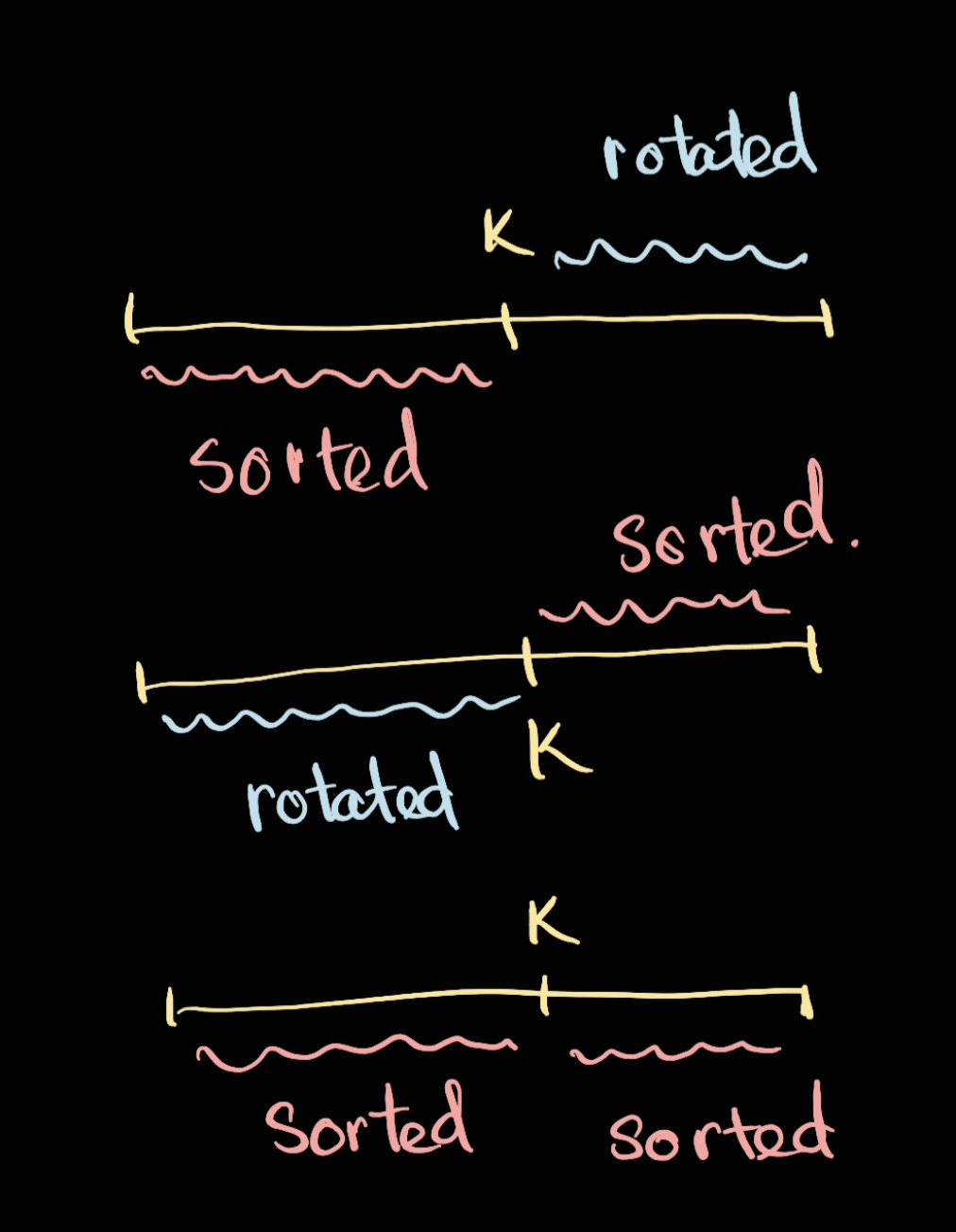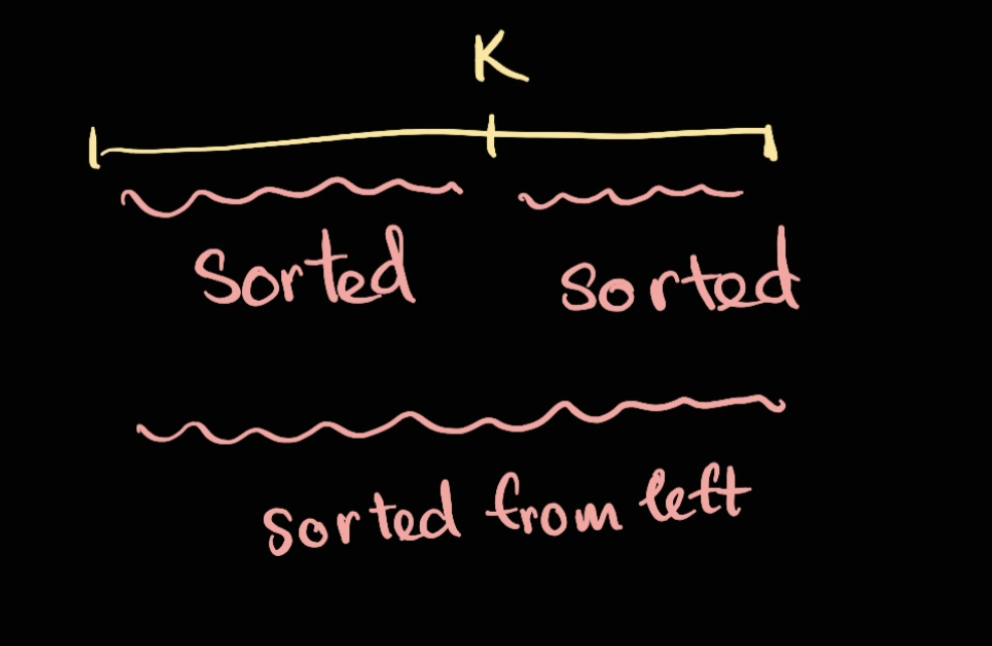Binary Search In Rotated Sorted Array
Question
There is an integer array nums sorted in ascending order (with distinct values).
Prior to being passed to your function, nums is possibly rotated at an unknown pivot index k (1 <= k < nums.length) such that the resulting array is [nums[k], nums[k+1], ..., nums[n-1], nums[0], nums[1], ..., nums[k-1]] (0-indexed). For example, [0,1,2,4,5,6,7] might be rotated at pivot index 3 and become [4,5,6,7,0,1,2].
Given the array nums after the possible rotation and an integer target, return the index of target if it is in nums, or -1 if it is not in nums.
You must write an algorithm with O(log n) runtime complexity.
Input: nums = [4,5,6,7,0,1,2], target = 0
Output: 4
Input: nums = [4,5,6,7,0,1,2], target = 3
Output: -1
Input: nums = [1], target = 0
Output: -1
Constraints:
1 <= nums.length <= 5000-104 <= nums[i] <= 104- All values of
numsare unique. numsis an ascending array that is possibly rotated.-104 <= target <= 104
Solution
For this question there are 3 possible scenarios:

Given a pivot point , the scenarios are:
- The left handside is sorted and right hand side is rotated. For example
[7,8,9,|1|,2,3,4]is a rotated on the right hand side - The left handside is rotated, the right hand side is sorted. For example
[7,8,9,0,1,|2|,3,4,5,6] - There is no rotation: left handside is sorted and right handside is sorted as well. For example
[1,2,3,|4|,5,6,7,8] - NOTE: For the case where we have equivalent side:
[7,8,|9|,1,2,3]we will consider it's left sorted.- The reason is the sorted part here is inclusive, if we assume this is right sorted and we're looking for something on the right we cant use the condition that
if target > mid and target <= right then search on the rightsince the target is not greater than mid.
- The reason is the sorted part here is inclusive, if we assume this is right sorted and we're looking for something on the right we cant use the condition that
Note:
- The
|x|denotes the middle point. - There is no condition the whole array is rotated due to the requirements of the question.
Implementation
When looking for element x, we want to determine if x is in the sorted array. We can determine this since the array is sorted. Else we will just search in the rotated space.
class App:
def search(self, nums: List[int], target: int) -> int:
if len(nums) == 0: return -1
left, right = 0, len(nums) - 1
while left <= right:
mid = (left + right) // 2
if nums[mid] == target:
return mid
rightSorted = nums[mid] < nums[left] # Mid is supposed to be > left normally, so left rotated
leftSorted = nums[mid] > nums[right] # Mid is supposed to be < right normally, so right rotated
if rightSorted:
# We can determine if element is on the right
if target > nums[mid] and target <= nums[right]:
# Search on the right
left = mid + 1
else:
# if not on the right then on the rotated path
right = mid - 1
elif leftSorted:
# We can determine if element is on the left
if target >= nums[left] and target < nums[mid]:
# Search on the left
right = mid - 1
else:
# if not on the left then on the rotated path
left = mid + 1
else:
# Normal, no rotation
if target < nums[mid]:
right = mid - 1
else:
left = mid + 1
return -1
If the array is normal, the following condition has to hold true:
nums[left] < nums[mid] < nums[right]
If nums[mid] < nums[left]: which means left is rotated
If nums[mid] > nums[right]: which means right is rotated
Note: in here we're not counting mid is part of the left group or the right group. However we'll discuss this in optimisation
Time Complexity:
Space Complexity:
Optimisation
There is not much to optimise here except for code style.

If you really think about it, there is actually only 2 scenarios:
leftSortedrightSorted
We can just simply combine the no rotation as leftSorted. Why? The condition of them is the same:
For no rotation, we do a normal binary search:
if target < num_at_mid:
search_left
else:
search_right
This logic is also applicable for leftSorted as well:
if target > nums_left and target < num_at_mid:
search_left
else:
search_right
Well if you think about it, if there is no rotation, of course target > nums_left.
So we have the final shortened code:
class App:
def search(self, nums: List[int], target: int) -> int:
if len(nums) == 0: return -1
left, right = 0, len(nums) - 1
while left <= right:
mid = (left + right) // 2
if nums[mid] == target:
return mid
rightSorted = nums[mid] < nums[left]
if rightSorted:
# We can determine if element is on the right
if target > nums[mid] and target <= nums[right]:
# Search on the right
left = mid + 1
else:
# if not on the right then on the rotated path
right = mid - 1
else:
# We can determine if the element is on the left
if target >= nums[left] and target < nums[mid]:
# Search on the left
right = mid - 1
else:
# if not on the left then on the rotated path
left = mid + 1
return -1